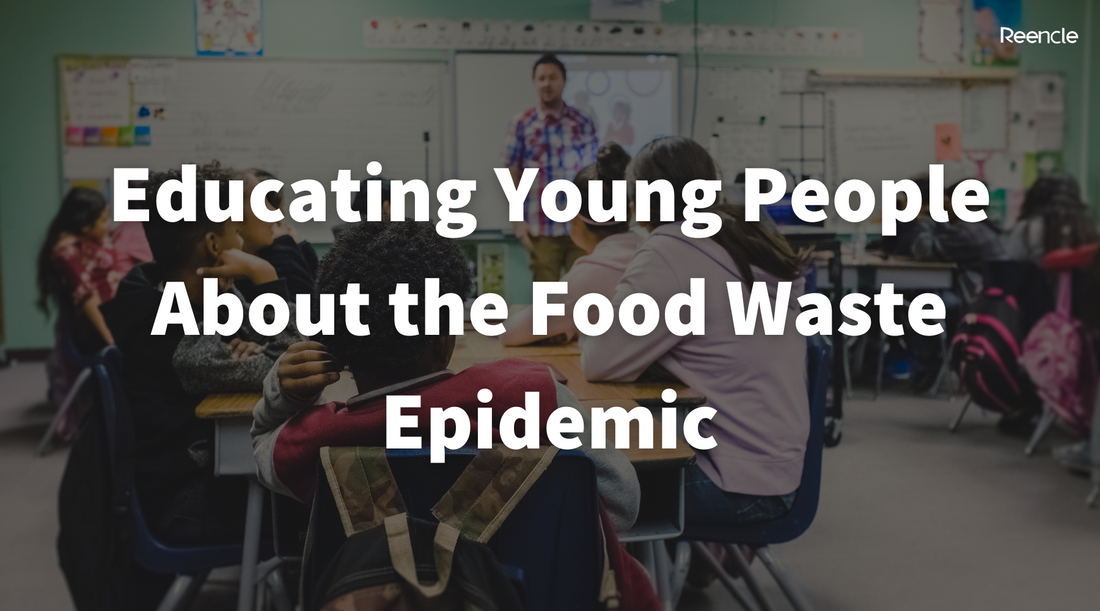In a world where hunger and environmental degradation coexist, the issue of food waste has emerged as a pressing concern. While the food waste epidemic is a complex problem with multifaceted causes and consequences, one critical solution lies in educating young people.
By instilling responsible food consumption habits in the younger generation, we can shape a brighter, more sustainable future. In this blog post, we will explore the importance of educating young people about the food waste epidemic and provide actionable strategies for doing so.

Why Educating Young People Matters
Young people are the future leaders, consumers, and decision-makers of our world. Equipping them with the knowledge and values necessary to combat food waste is vital for these reasons:
Lifelong Habits
Habits formed during childhood tend to persist into adulthood. Educating young people about food waste can establish lifelong behaviours that prioritize sustainability.
Generational Change
Young people often act as catalysts for change within their families. When they learn about food waste, they can influence their parents, siblings, and peers to adopt more responsible practices.
Creative Solutions
Young minds are often more receptive to innovative ideas and solutions. Therefore, by engaging young people in discussions about food waste, we can tap into their creativity to develop new approaches to reducing waste.
Empowerment
Knowledge empowers individuals to make informed choices. Educating young people about the food waste epidemic gives them agency in addressing this critical issue.

Strategies for Educating Young People
Now that we understand the significance of educating young people about food waste, let's explore practical strategies to achieve this goal:
- Incorporate Food Education into The School Curriculum
- Integrate lessons on food waste, sustainability, and nutrition into school curricula.
- Organize field trips to local farms, food banks, and recycling centres to provide real-world context.
- Encourage teachers to incorporate food waste reduction projects into their classrooms.
- Start School Gardens and Composting Programs
- School gardens teach students about food production and the value of fresh produce.
- Composting programs can demonstrate the cycle of food waste and its potential for beneficial reuse.
- Promote Experiential Learning
- Encourage hands-on experiences, such as cooking classes, where students can learn about food preparation and the importance of using ingredients wisely.
- Organize cooking competitions that challenge students to create meals using leftovers or food that might otherwise be discarded.
- Raise Awareness Through Social Media
- Utilize social media platforms to share information, infographics, and success stories related to food waste reduction.
- Encourage students to participate in online campaigns and challenges aimed at reducing food waste.
- Partner with Local Organizations
- Collaborate with local food banks, environmental organizations, and businesses to provide resources, speakers, and workshops on food waste reduction.
- Establish mentorship programs that connect students with professionals in sustainability fields.
- Create School-Based Initiatives
- Implement school-wide initiatives, such as "Waste-Free Wednesdays," where students are encouraged to bring lunches with minimal packaging.
- Set up food recovery programs to collect surplus cafeteria food for donation to local charities.
- Emphasize the Economics of Food Waste
- Teach students about the financial implications of food waste, both on a personal and global scale.
- Explore concepts like meal planning, portion control, and budgeting to reduce waste and save money.
-
Encourage Critical Thinking
- Promote critical thinking by asking students to analyze food waste data and identify patterns and solutions
- Engage in discussions about the role of marketing and consumerism in driving food waste.
- Showcase Role Models and Success Stories
- Share stories of individuals and organizations making a difference in the fight against food waste.
- Highlight celebrities, chefs, and activists who advocate for sustainable food practices.
- Celebrate Achievements
- Recognize and reward students and schools that excel in reducing food waste.
- Host events or assemblies to showcase projects and initiatives related to food waste reduction.

Educating young people about the food waste epidemic is not just about teaching them to finish their plates but instilling in them a sense of responsibility, empathy, and the knowledge to make informed choices.
By incorporating food education into school curricula, fostering experiential learning, and leveraging the power of social media, we can nurture a generation of conscious consumers who are equipped to combat the food waste crisis. With their enthusiasm, creativity, and determination, young people hold the key to a more sustainable and equitable future.

